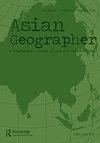过去两个世纪青藏高原东部8月至9月气温变化的树木年轮密度推断
IF 2.2
Q2 GEOGRAPHY
引用次数: 4
摘要
摘要气候变化,特别是工业革命以来的快速变暖,在过去的几十年里引起了人们的广泛关注。然而,青藏高原的仪器气候记录很短,阻碍了我们对气候现状的理解。尽管已经在TP上开发了基于树木年轮的温度重建,但增加采样点的空间分布可以提高我们对最近变暖的理解。在这里,我们提出了一个新的生长在TP东部上部树线附近的Balfour云杉(Picea likiangensis var.balfouriana)的年轮最大晚木密度年表,并用它重建了自公元1837年以来的夏末(8月至9月)平均温度。重建解释了1957年至2014年校准期间仪器8月至9月平均温度实际变化的61.7%,并代表了TP东部和东南部的区域尺度温度变化。8月至9月的平均温度重建揭示了过去两个世纪中三个相对寒冷的阶段(1850年代至1870年代、1900年代至1910年代和1960年代)和两个温暖的时期(1930年代至1940年代和1972年至2014年)。我们的重建与研究区附近其他独立的基于树木年轮的温度记录和冰川波动文件的比较表明,在寒冷和温暖阶段具有良好的一致性。自20世纪60年代以来,我们的重建显示出明显而持续的温度上升,为TP最近的变暖提供了新的证据。此外,我们的结果表明,TP东部8月至9月的平均温度变化与厄尔尼诺/南方涛动和大西洋数十年振荡有潜在联系。本文章由计算机程序翻译,如有差异,请以英文原文为准。
Tree-ring-density inferred August–September temperature variability on the eastern Tibetan Plateau for the past two centuries
ABSTRACT Climate change, especially the rapid warming since the industrial revolution, has drawn much attention over the past decades. However, the short instrumental climate records on the Tibetan Plateau (TP) impede our understanding of the current status of climate. Although tree-ring-based temperature reconstructions have been developed on the TP, increasing the spatial distribution of sampling sites can improve our understanding of the recent warming. Here we present a new tree-ring maximum latewood density chronology of Balfour spruce (Picea likiangensis var. balfouriana) growing near the upper treeline on the eastern TP, and use it to reconstruct late summer (August–September) mean temperature since AD 1837. The reconstruction explains 61.7% of the actual variance of instrumental August–September mean temperature over the calibration period 1957–2014, and represents regional-scale temperature variations over the eastern and southeastern TP. The August–September mean temperature reconstruction reveals three relatively cold phases (the 1850s–1870s, the 1900s–1910s and the 1960s) and two warm periods (the 1930s–1940s and 1972–2014) over the past two centuries. Comparisons of our reconstruction with other independent tree-ring-based temperature records and glacier fluctuation documents near our research area show good consistencies in those cold and warm phases. Our reconstruction exhibits a pronounced and persistent temperature rise since the 1960s, providing a new line of evidence for the recent warming on the TP. Moreover, our results indicate that the August–September mean temperature variability over the eastern TP has a potential linkage with the EI Nino/Southern Oscillation and the Atlantic Multi-decadal Oscillation.
求助全文
通过发布文献求助,成功后即可免费获取论文全文。
去求助
来源期刊

Asian Geographer
GEOGRAPHY-
CiteScore
3.30
自引率
0.00%
发文量
7
期刊介绍:
Asian Geographer disseminates knowledge about geographical problems and issues focusing on Asia and the Pacific Rim. Papers dealing with other regions should have a linkage to Asia and the Pacific Rim. Original and timely articles dealing with any field of physical or human geographical inquiries and methodologies will be considered for publication. We welcome, for example, submissions on people-environment interactions, urban and regional development, transport and large infrastructure, migration, natural disasters and their management, environment and energy issues. While the focus of the journal is placed on original research articles, review papers as well as viewpoints and research notes under the category of “Asian Geography in Brief” are also considered. Review papers should critically and constructively analyse the current state of understanding on geographical and planning topics in Asia. The ‘Asian Geography in Brief’ section welcomes submissions of applied geographical and planning research about Asia. The section aims to showcase (1) the diverse geography and planning of Asia; and (2) the diverse geographical and planning research about Asia. The journal will also publish special issues on particular themes or areas. Book reviews can be included from time to time.
 求助内容:
求助内容: 应助结果提醒方式:
应助结果提醒方式:


